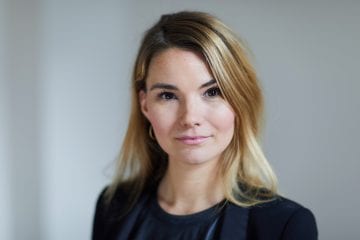Fostering dialogue across the Baltic Sea

Laura Hirvi,
Dr., Director,
Finnland-Institut in Deutschland | The Finnish Institute in Germany,
one of the seventeen Finnish Academic and Cultural Institutes worldwide,
Germany
© Finnland-Institut in Deutschland/photo: Bernhard Ludewig
The Finnish Institute in Germany was founded in 1994 with the purpose of fostering dialogue and the exchange of ideas between Finland and German-speaking Europe in the fields of culture, science and economics. Altogether there are 17 Finnish Institutes throughout the world that share a common goal of promoting peace by fostering dialogue and collaboration across national borders. Art exhibitions, readings, poetry slams, concerts, workshops, residencies and seminars are just some of the events that the Institutes arrange in order to achieve this goal.
The Finnish Institute in Germany supports and enables on average more than 150 events each year that reach around 150,000 people. Around 30% of these events take place in Berlin, where the Finnish Institute is located, while 70% are realised elsewhere in Germany, Austria and Switzerland. In 2019, for example, Finland had the honour of being the guest country at Vienna Design Week in Austria.
Design stands alongside Sibelius, Alvar Aalto and the Finnish education system as one of the strongest associations that people have in relation to Finland. However, our aim at the Finnish Institute is to go beyond the well-known and typical notions that exist of Finland. Through our programme, which we always plan in close collaboration with local partners, we intend to offer a more diverse and complex image of the country located in Northern Europe. Hence, the exhibition ”Wild at Heart”, for which we commissioned Tero Kuitunen at the Vienna Design Week, was curated with the intention to offer the audience an exciting and fresh perspective of Finland’s contemporary design scene. At the same time, the purpose of such exhibitions is to offer visibility for the work of creative professionals from Finland and to offer them access to new, international networks and job opportunities.
In the field of literature, Finland has a lot to offer, and the Finnish Institute has also been very active during its 25 years of existence in promoting German translations of Finnish fiction, non-fiction, poetry, as well as literature for children and young adults. The highlight within this framework has been the Leipzig Book Fair, which takes place annually in March and gathers almost 300,000 visitors in only four days. There, all five Nordic Countries share a common booth, the “Nordic Forum”, where a variety of writers from these countries present their most recently translated works in Germany.
Due to the focus on Vienna in 2019, Finland also took part in the book fair Buch Wien in November, together with colleagues from Denmark, Norway and Sweden. After this wonderfully successful experience, future participation is already being planned for the coming years.
Another important principle that drives the work of the Finnish Institute in Germany is an interest in dealing with topics that are of global concern. We therefore focused our 2016 annual programme on the topic of “mobility and migration”, for example, and in 2020 we addressed in our programme the ways in which human beings and nature interact. So far, the majority of events that we have organised involved people travelling across national borders in order to meet physically at a location for a certain period of time. In the future, however, travel might be limited due to a growing interest in sustainability or driven by concerns to avoid the spread of COVID-19. At the same time, the possibilities of engaging with others on digital platforms are becoming more diverse and offer exciting prospects when it comes to the question of accessibility. Audiences all over the world can follow the streaming of an event, as long as they have an internet connection and a suitable device at hand. Geographical location doesn‘t matter anymore. The challenge with organising events in this manner will be how to transfer the magical and unique relationship that often evolves between a performer and its audience from the offline to the online world.
Current times show us how important it is to encourage cooperation between people and institutions across all kinds of borders, whether they are national, social, or disciplinary in nature. Today’s global challenges demand teamwork and joint answers – only together can we reach sustainable solutions for the future.
Expert article 2844
> Back to Baltic Rim Economies 4/2020
To receive the Baltic Rim Economies review free of charge, you may register to the mailing list.
The review is published 4-6 times a year.
